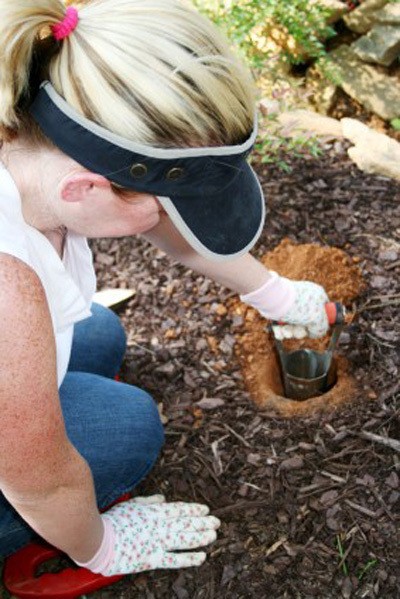
EllenB
Gold Post Medal for All Time! 858 Posts Fall is the season for planting spring-blooming bulbs. The idea of planting dozens of bulbs can seem like an intimidating task - especially to new gardeners. Here are some tips and techniques to help make the job easier.
Buying Bulbs
- Whenever possible, buy loose bulbs locally. The selection may be smaller than shopping by catalog, but it gives you the advantage of being able to visually inspect each bulb and reject those showing any signs of mold or rot.
- Look for local suppliers that sell bulbs at the appropriate planting time, not months before. If you shop from a mail-order supplier, make sure they ship bulbs to you at the proper planting time (not earlier). Ask them if they offer a guarantee or refund policy.
- Shop early. Both local retailers and mail order suppliers offer the best selections early in the season.
- Buy the biggest, heaviest bulbs you can afford. They generally produce the best flowers, and are better candidates for producing offsets to increase your stock.
Selecting A Site
- Most spring-flowering bulbs grow best in full sun. This doesn't mean, however, that they won't grow well if planted under deciduous trees. Their active growing season occurs before most trees leaf out, so they will still receive plenty of sunshine in the spring.
- Bulbs need loose, humus-rich soil to grow roots and shoots. A site with well-drained soil is necessary, as most bulbs will easily succumb to rot if forced to stand in water for any length of time. Raised beds make for easy planting and are a great way to compensate for poor drainage or compacted soils. A pH of 6.0 to 7.0 is best, but many will tolerate slightly more acidic soils.
Planting Times
Planting Techniques
- In general, bulbs should be planted at a depth three to four times the height of the bulb. This protects the bulbs against frost, foraging animals, and possible physical damage from hoeing.
- Bulb planters come in different shapes and sizes, from very small tools called dibbers, to hand-held planters, and long-handled planters in which you use your feet as leverage for pushing into the soil. No matter what tool you use, the planting steps are basically the same. Push the tool into the soil. Stop at the desired depth. Twist the planter and lift out the soil. Place the bulb in the bottom of the hole. Fill the hole with dirt from the planter. Repeat.
- Using planters to dig individual holes works well when planting a small number of bulbs or filling in spaces between perennial shrubs and flowers. For mass plantings, use a garden shovel or spade to clear away all of the turf and create one large planting bed.
Thwarting Pests
- Many rodents, especially squirrels, love to dig up and dine on certain types of bulbs. Laying wire mesh (e.g. chicken fence) over the soil surface above your bulbs is a great way to prevent squirrels from digging them up. The bulbs will still be able to shoot through the mesh, but animals won't be able to get to the bulbs. Another method is to enclose entire beds with a wire cage.
- An alternative to fighting with animal pests is to plant the types of bulbs they don't like to eat. Daffodil bulbs are poisonous, and therefore avoided by even the hungriest of animals. Squills and snowdrops are also typically left alone.
Popular Spring Flowering Bulbs
- Checkered Lily, Guinea-Hen Flower - Fritillaria meleagris
- Common Grape Hyacinth - Muscari botryoides
- Common Hyacinth - Hyacinthus orientalis
- Common Snowdrop - Galanthus nivalis
- Crocus - Crocus species
- Daffodil, Narcissus, Jonquil - Narcissus species
- Dutch Hybrid Iris - Iris hybrids
- Giant Flowering Onion - Allium giganteum
- Glory-of-the-Snow - Chionodoxa luciliae
- Grecian Windflower, Green Anemone - Anemone blanda
- Siberian Squill - Scilla siberica
- Tulip - Tulipa species
- Winter Aconite - Eranthis hyemalis

About The Author: Ellen Brown is an environmental writer and photographer and the owner of Sustainable Media, an environmental media company that specializes in helping businesses and organizations promote eco-friendly products and services.
Add your voice! Click below to comment. ThriftyFun is powered by your wisdom!

November 19, 20100 found this helpful
What happened to planting time for Zone 8?

Allison
Bronze Feedback Medal for All Time! 231 Feedbacks November 19, 20100 found this helpful
I also add a little marker in the soil so I remember what is planted where. You think you'll remember, but the winter has a way of erasing your memory!
Also, don't forget to divide large bulbs.
Add your voice! Click below to comment. ThriftyFun is powered by your wisdom!

